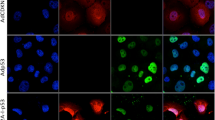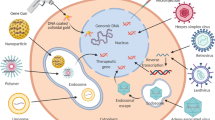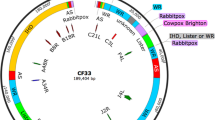Abstract
A retroviral vector containing the wild–type p53 gene under control of a β–actin promoter was produced to mediate transfer of wild–type p53 into human non–small cell lung cancers by direct injection. Nine patients whose conventional treatments failed were entered into the study. No clinically significant vector–related toxic effects were noted up to five months after treatment. In situ hybridization and DNA polymerase chain reaction showed vector–p53 sequences in posttreatment biopsies. Apoptosis (programmed cell death) was more frequent in posttreatment biopsies than in pretreatment biopsies. Tumor regression was noted in three patients, and tumor growth stabilized in three other patients.
This is a preview of subscription content, access via your institution
Access options
Subscribe to this journal
Receive 12 print issues and online access
$209.00 per year
only $17.42 per issue
Buy this article
- Purchase on Springer Link
- Instant access to full article PDF
Prices may be subject to local taxes which are calculated during checkout
Similar content being viewed by others
References
Mukhopadhyay, T., Tainsky, M., Cavender, A.C. & Roth, J.A. Specific inhibition of K-ras expression and tumorigenicity of lung cancer cells by antisense RNA. Cancer Res. 51, 1744–1748 (1991).
Takahashi, T. et al. Wild-type but not mutant p53 suppresses the growth of human lung cancer cells bearing multiple genetic lesions. Cancer Res. 52, 2340–2343 (1992).
Goyette, M.C. et al. Progression of colorectal cancer is associated with multiple tumor suppressor gene defects but inhibition of tumorigenicity is accom ished by correction of any single defect via chromosome transfer. Mol. Cell.Biol. 12, 1387–1395 (1992).
Weinberg, R.A. Tumor suppressor genes. Science 254, 1138–1145 (1992).
Bishop, J.M. Molecular themes in oncogenesis. Cell 64, 235–248 (1991).
Knudson, A.G., Mutation and cancer: Statistical study of retinoblastoma. Proc. Natl. Acad. Sci. USA 68, 820–823 (1971).
Cai, D.W., Mukhopadhyay, T., Liu, Y.J., Fujiwara, T. & Roth, J.A. Stable expres sion of the wild-type p53 gene in human lung cancer cells after retrovirus-mediated gene transfer. Hum. Gene Ther. 4, 617–624 (1993).
Hollstein, M., Sidransky, D., Vogelstein, B. & Harris, C.C. p53 mutations in human cancers. Science 253, 49–53 (1991).
Fujiwara, T. et al. Therapeutic effect of a retroviral wild-type p53 expression vector in an orthotopic lung cancer model. J. Natl. Cancer Inst. 86, 1458–1462 (1994).
Zhang, W. et al. High-efficiency gene transfer and high-level expression of wild-type p53 in human lung cancer cells mediated by recombinant adenovirus. Cancer Gene Ther. 1, 5–13 (1994).
Liu, T.J. et al. Growth suppression of human head and neck cancer cells by the introduction of a wild-type p53 gene via a recombinant adenovirus. Cancer Res. 54, 3662–3667 (1994).
Zhang, Y.J., Mukhopadhyay, T., Donehower, L.W., Georges, R.N. & Roth, J.A. Retroviral vector-mediated transduction of K-ras antisense RNA into human lung cancer cells inhibits expression of the malignant phenotype. Hum. Gene Ther. 4, 451–460 (1993).
Kitamura, H. et al. Proliferative potential and p53 overexpression in precursor and early stage lesions of bronchioloalveolar lung carcinoma. Am. J. Pathol. 146, 876–887 (1995).
Tamiya, T. et al. Transgene inheritance and retroviral infection contribute to the efficiency of gene expression in solid tumors inoculated with retroviral vector producer cells. Gene Ther. 2, 531–538 (1995).
Knol, J.A. et al. Incorporation of 5-bromo-2'-deoxyuridine into colorectal liver metastases and liver in patients receiving a 7-day hepatic arterial infusion. Cancer Res. 55, 3687–3691 (1995).
Fujiwara, T. et al. A retroviral wild-type p53 expression vector penetrates human lung cancer spheroids and inhibits growth by inducing apoptosis. Cancer Res. 53, 4129–4133 (1993).
Cusack, J.C., Zhang, W., Cristiano, R.J. & Roth, J.A. High levels of gene expression in human large cell lung center tumors following intralesional injection of recombinant adenovirus. Cancer Gene Ther. (in the press).
Yonish-Rouach, E. et al. Wild-type p53 induces apoptosis of myeloid leukemic cells that is inhibited by interleukin-6. Nature 352, 345–347 (1991).
Shaw, P. et al. Induction of apoptosis by wild-type p53 in a human colontumor-derived cell line. Proc. Natl. Acad. Sci. USA 89, 4495–4499 (1992).
Debbas, M. & White, E. Wild-type p53 mediates apoptosis by E1A, which is in hibited by E1B. Genes Dev. 7, 546–554 (1993).
Owenschaub, L.B. et al. Wild-type human p53 and a temperature-sensitive mutant induce Fas/APO-1 expression. Mol. Cell Biol. 15, 3032–3040 (1995).
Wang, J., Bucana, CD., Roth, J.A. & Zhang, W.W. Apoptosis induced in humanosteosarcoma cells is one of the mechanisms for the cytocidal effect of Ad5CMV-p53. Cancer Gene Ther. 2, 9–17 (1995).
Diller, L. et al. p53 functions as a cell cycle control protein in osteosarcomas. Mol Cell. Biol. 10, 5772–5781 (1990).
Livingstone, L.R. et al. Altered cell cycle arrest and gene amplification potential X accompany loss of wild-type p53. Cell 70, 923–935 (1992).
Yin, Y.X., Tainsky, M.A., Bischoff, F.Z., Strong, L.C. & Wahl, G.M. Wild-type p53 restores cell cycle control and inhibits gene amplification in cells with mutant p53 alleles. Cell 70, 937–948 (1992).
Kuerbitz, S.J., Plunkett, B.S., Walsh, W.V. & Kastan, M.B. Wild-type pS3 is a cell cycle checkpoint determinant following irradiation. Proc. Natl. Acad. Sci. USA 89, 7491–7495 (1992).
Kastan, M.B. et al. A mammalian cell cycle checkpoint pathway utilizing p53 and GADD45 is defective in ataxia-telangiectasia. Cell 71, 587–597 (1992).
Johnson, L.G. et al. In vitro assessment of variables affecting the efficiency and efficacy of adenovirus-mediated gene transfer to cystic fibrosis airway epithelia. Hum. Gene Ther. 7, 51–59 (1996).
Dillman, R.O. et al. A randomized trial of induction chemotherapy plus high-dose radiation versus radiation alone in stage III non-small-cell lung cancer. N.Engl. J. Med. 323, 940–945 (1990).
Fujiwara, T. et al. Induction of chemosensitivity in human lung cancer cells in vivo by adenoviral-mediated transfer of the wild-type p53 gene. Cancer Res. 54, 2287–2291 (1994).
Schneider, P.M. et al. Mutations of p53 in Barrett's esophagus and Barrett's cancer: A prospective study of ninety-eight cases. J. Thorac. Cardiovasc. Surg. 111, 3233231; discussion 33131;3 (1996).
Casson, A.G. et al. p53 gene mutations in Barrett's epithelium and esophageal cancer. Cancer Res. 51, 4495–4499 (1991).
Sundaresan, V. et al. p53 and chromosome-3 abnormalities, characteristic of malignant lung tumours, are detectable in preinvasive lesions of the bronchus. Oncogene 7, 1989–1997 (1992).
Kishimoto, Y. et al. Allele-specific loss in chromosome 9p loci in preneoplastic lesions accompanying non-small-cell lung cancers. J. Natl. Cancer Inst. 87, 1224–1229 (1995).
Vahakangas, K.H. et al. Mutations of p53 and ras genes in radon-associated lung cancer from uranium miners. Lancet 339, 576–580 (1992).
Roth, J.A. Recombinant DNA Advisory Committee. Minutes of meeting of September 14315, 1992. Hum. Gene Ther. 4, 365–389 (1993).
Roth, J.A. Modification of tumor suppressor gene expression in non-small cell lung cancer (NSCLC) with a retroviral vector expressing wildtype (normal) p53. Hum. Gene Ther. 7, 861–874 (1996).
Miller, A.D. & Rosman, G.J. Improved retroviral vectors for gene transfer and expression. Biotechniques 7, 980–990 (1989).
Cornetta, K. & Anderson, W.F. Protamine sulfate as an effective alternative to polybrene in retroviral-mediated gene-transfer: Implications for human gene therapy. J. Virol. Methods 23, 187–194 (1989).
Chung, K.Y. et al. Discordant p53 gene mutations in primary head and neck cancers and corresponding second primary cancers of the upper aerodigestive tract. Cancer Res. 53, 1676–1683 (1993).
Ajani, J.A., Welch, S.R., Raber, M.N., Fields, W.S. & Krakoff, I.H. Comprehensive criteria for assessing therapy-induced toxicity. Cancer Invest. 8, 147–159 (1990).
Author information
Authors and Affiliations
Rights and permissions
About this article
Cite this article
Roth, J., Nguyen, D., Lawrence, D. et al. Retrovirus–mediated wild–type P53 gene transfer to tumors of patients with lung cancer.. Nat Med 2, 985–991 (1996). https://doi.org/10.1038/nm0996-985
Received:
Accepted:
Issue Date:
DOI: https://doi.org/10.1038/nm0996-985
This article is cited by
-
A role for bioinorganic chemistry in the reactivation of mutant p53 in cancer
JBIC Journal of Biological Inorganic Chemistry (2022)
-
Apoptosis Detection Methods in Diagnosis of Cancer and Their Potential Role in Treatment: Advantages and Disadvantages: a Review
Journal of Gastrointestinal Cancer (2021)
-
The long non-coding RNA PIK3CD-AS2 promotes lung adenocarcinoma progression via YBX1-mediated suppression of p53 pathway
Oncogenesis (2020)
-
Cell death pathologies: targeting death pathways and the immune system for cancer therapy
Genes & Immunity (2019)
-
Recombinant Newcastle disease virus expressing P53 demonstrates promising antitumor efficiency in hepatoma model
Journal of Biomedical Science (2016)



